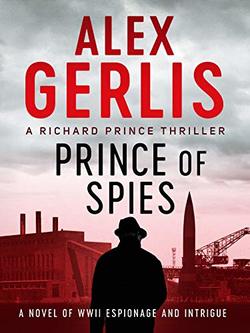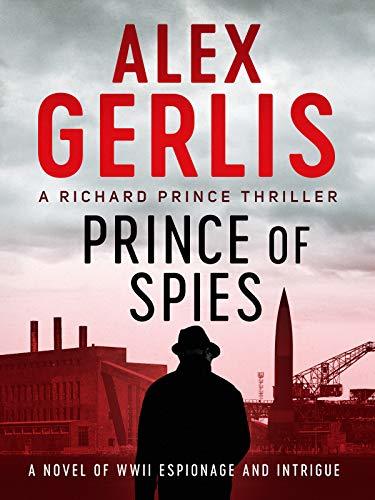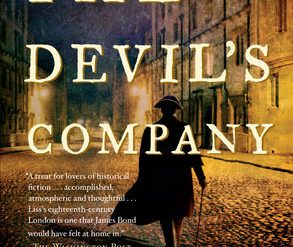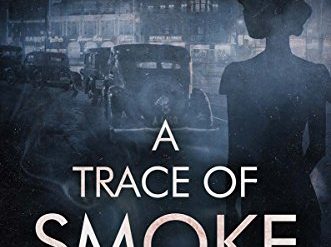
Alex Gerlis is the author of four outstanding standalone World War II spy novels (The Best of Our Spies, The Swiss Spy, Vienna Spies, and The Berlin Spies), all of which I enjoyed enormously. I can’t quite say the same about his most recent novel of espionage in that era, Prince of Spies—a tale about a mission to undermine the development of the Nazi V-2 rocket.
The book is reasonably good—it’s certainly suspenseful, and Gerlis’ research is right on target as always—but something feels contrived about the story. I suspect the feeling of artificiality comes from the fact that the novel is billed as the first of a series about its protagonist, Richard Prince. It’s not that Prince lacks credibility as an espionage agent. But he seems to be just a little too good at it straight out of the gate. And the Gestapo agents he encounters come across as far less competent than I’ve been led to believe from reading a great deal of nonfiction about espionage during the war.
Prince of Spies (Richard Prince #1) by Alex Gerlis (2020) 352 pages @@@@ (4 out of 5)
Richard Prince is an admired Detective Superintendent on England’s southern coast whose boss had refused to let him enlist. So, when an opportunity to join the Special Operations Executive (SOE) comes along, he’s all too willing. The problem is, Prince had recently lost his wife and daughter in a car crash and was left alone to father his three-year-old son. He’s reluctant to leave his son. But with the assurance that he’ll be on a mission to Denmark for only a couple of months, he relents.
Prince’s target: the Nazi V-2 rocket
It’s September 1942. Like nearly all of Europe, Denmark is occupied by Nazi Germany. And a businessman there has gotten word to London that he has access to top-secret information about the Nazis’ miracle weapons, the V-1 flying bomb and V-2 rocket. They’re under development at Peenemünde on the Baltic coast in Germany near the Danish border. Prince is to infiltrate into Denmark, make contact with the businessman, retrieve the information, and hightail it back to London. But of course it’s nowhere nearly as simple as that.
A spy who is a little too good to be true
The SOE has turned to Prince not just because he is a brilliant police officer and deemed to be resourceful but because he just happens to speak Danish like a native. It turns out that his mother was Danish. They spoke the language at home from his infancy. Oh, and he also speaks fair-to-middling German and some French as well. Naturally, all these languages will figure in Prince’s more than half-year odyssey in Denmark and Germany before he is able to return to Britain. And the time will prove so fraught with danger that he is lucky to escape with his life.
A story grounded in history
As in his other novels, Gerlis builds his story around historical events and individuals.
- For one thing, the Nazi V-2 rocket was, indeed, a major threat to Britain. Had the Germans managed to move its development forward on schedule, they could conceivably have brought the island nation to its knees. And that rocket, not so incidentally, was the invention that launched the space race once the US and Russia managed to import its developers following World War II.
- One important character, “Lord Swalcliffe . . . is loosely based on Frederick Lindemann, Viscount Cherwell.” He was Churchill’s scientific adviser and intimate friend. In the novel, as in reality, the Lindemann character fought relentlessly against those in the SOE and the Air Ministry who feared the potential of the V-1 and V-2 programs. He also backed harebrained schemes that caught Churchill’s imagination and his own as well as several critical ideas that panned out well.
- And “there was a major RAF raid [on Peenemünde] not dissimilar to the one described” in the novel—the ultimate object of Prince’s mission. That raid delayed the weapons’ development by several critical months.
For additional reading
Check out my guide to the Top-notch spy novels from Alex Gerlis.
You might also enjoy my posts:
- The 10 top espionage novels reviewed on this site;
- 20 good nonfiction books about espionage;
- The 10 best novels about World War II (with 20+ runners-up): and
- Top 10 mystery and thriller series.
If you enjoy reading history in fictional form, check out 20 most enlightening historical novels (plus dozens of runners-up). And if you’re looking for exciting historical novels, check out Top 10 historical mysteries and thrillers reviewed here (plus 100 others).
And you can always find my most popular reviews, and the most recent ones, plus a guide to this whole site, on the Home Page.


























